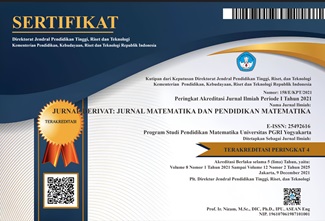Penerapan Pembelajaran MEA (Means-End Analysis) Berbantuan Schoology Untuk Meningkatkan Hasil Belajar Matematika
DOI:
https://doi.org/10.31316/j.derivat.v8i1.1275Abstract
The low learning outcomes of students, because they have difficulty in solving the problems given, especially trigonometry material and the lack of interest of students in participating in the mathematics learning process. In addition, teachers and students have not utilized information technology optimally, so efforts are needed to improve student learning outcomes by applying MEA (Means-End Analysis) learning. The research subjects were all class VIII students of SMA Negeri 1 Pekalongan in the 2018/2019 academic year. Research sample is class XI b, which amounted to 22 students. The purpose of this classroom action research to determine the increase in learning outcomes of students who get the MEA (Means-End Analysis) learning model assisted by Schoology. Based on the results of the class action research conducted and the discussion that has been described, it can be concluded that the MEA (Means-End Analysis) learning model assisted by Schoology can improve the learning outcomes of class XI students of SMA Negeri 1 Pekalongan in the 2018/2019 Academic Year. Learning outcomes have increased from pre-survey to cycle I wherein the survey that is 31,82% to 45,45%, students who are thoroughly studied have increased by 13,63%. in cycle II the learning outcomes of students increased from Cycle I is 45,45% to 95,45%, students who have completed learning have increased by 50%.
Keywords: learning MEA (Means-End Analysis), Schoology, learning outcomes
References
Aminoto, T & Pathoni, H. 2014. Penerapan Media E-learning Berbasis Schoology Untuk Meningkatkan Aktivitas dan Hasil Belajar Materi Usaha dan Energi Di Kelas XI SMA N 10 Kota Jambi. Jurnal Sainmatika. Vol. 8, No. 1, hal. 13-29
Arikunto, S. (2013). Prosedur Penelitian Suatu Pendekatan Praktik. Jakarta: Rineka Cipta
Harto, Ketut. Teddi. dkk. (2014). Pengaruh Model Pembelajaran MEA dengan Setting Belajar Kelompok Berbantuan LKS Terhadap Hasil Belajar Matematika Siswa. E-jurnal Mimbar PGSD Universitas Pendidikan Ganesha (Online). Vol. 2, No. 1, Hal 1-10
Huda, M. (2014). Model-Model Pembelajaran. Yogyakarta: Pustaka Pelajar.
Mukhlason, A. (2019). Penerapan Model Means End Analysis Untuk Meningkatkan Hasil Belajar Siswa Materi Fluida. Jurnal Inovasi Pendidikan Fisika Dan Intograsinya. Vol. 2, No. 02. hal. 55-66
Nugroho, dkk. (2017). Penerapan Model Means Ends Analysis (Mea) Untuk Meningkatkan Kemampuan Menyelesaikan Soal Cerita Mata Pelajaran Matematika Pada Siswa Sekolah Dasar. Didaktika Dwija Indria, Vol. 5, No. 4
Juniyarti, N. (2014). Penerapan Model Pembelajaran Means End Analysis (MEA) Dalam Setting Di Untuk Meningkatkan Hasil Belajar Siswa. Berkala Ilmiah Pendidikan Fisika, Vol. 2, No. 3, hal. 204. https://doi.org/10.20527/bipf.v2i3.851
Murni, K., C. (2016). Pengaruh E-learning Berbasis Schoology Terhadap Peningkatan Hasil Belajar Siswa Dalam Materi Perangkat Keras Jaringan Kelas X Tkj 2 pada SMK Negeri 3 Buduran, Sidoarjo. It-Edu, Vol. 1, No. 01, hal. 86–90.
Nurafiah, F., dkk. (2013). Perbandingan Peningkatan Kemampuan Berpikir Kritis Siswa SMP Antara yang Memperoleh Pembelajaran Means-Ends Analysis (MEA) dan Problem Based Learning (PBL). Jurnal Pengajaran MIPA (Online). Vol. 18, No. 1, hal. 1-8
Oktavia, L., A. dan Suprayitno. (2017). Penerapan Model Pembelajaran MEA (Means Ends Analysis) untuk Meningkatkan Kemampuan Berpikir Kritis Siswa pada Mata Pelajaran IPS Kelas IV SDN Simogirang 1 Prambon Sidoarjo. JPGSD. Vol. 5, No. 3, hal. 1158-1167
Prihatiningtyas, N. C., & Nurhayati, N. (2017). Penerapan Model Pembelajaran Means-Ends Analysis Untuk Meningkatkan Kemampuan Pemecahan Masalah Matematis Siswa. JPMI (Jurnal Pendidikan Matematika Indonesia), Vol. 2, No. 01, hal. 103. https://doi.org/10.26737/jpmi.v2i1.204
Purwaningsih, R. dkk. (2017). Pengaruh Penggunaan E-Learing Dengan Schoology Terhadap Hasil Belajar Peserta Didik. Jurnal Pembelajaran Fisika Universitas Lampung. Vol. 5, No. 4, hal. 51-61
Riana, A. A. (2017). Application of Means Ends Analysis (MEA) Learning Model in Attempt to Improve Student’s High Order Thinking. International Journal Pedagogy of Social Studies, 2(1), 145. https://doi.org/10.17509/ijposs.v2i1.8688
Sari, Yessy Novita. 2018. Pengaruh Penerapan Model Pembelajaran Means Ends Analysis Menggunakan Media Video Terhadap Keaktifan Belajar Peserta Didik Pada Mata Pelajaran Ekonomi di SMA Negeri 3 Pagar Alam. Jurnal Profit. Vol. 5, No. 1, hal. 89-104
Sukardi. 2012. Metode Penelitian Pendidikan Tindakan Kelas. Yogyakarta: Bumi Aksara.
Supratman, E., & Purwaningtias, F. (2018). Pengembangan Media Pembelajaran E-learning Berbasis Schoology. Jurnal Informatika: Jurnal Pengembangan IT, Vol. 3, No. 03, hal. 310–315. https://doi.org/10.30591/jpit.v3i3.958
Suyatno. 2009. Menjelajah Pembelajaran Inovatif. Sidoarjo: Masmedia Buana Pusaka
Trianto. 2010. Model Pembelajaran Terpadu. Jakarta: Bumi Aksara.
Widiantoro, B., & Rakhmawati, L. (2015). Pengembangan Media Pembelajaran E-learning Berbasis Schoology Pada Kompetensi Dasar Di SMKN 1 Jetis. Jurnal Pendidikan Teknik Elektro, Vol. 04, No. 2, hal. 501–506.
Downloads
Published
Issue
Section
Citation Check
License
Authors who publish with this journal agree to the following terms:
-
Authors retain copyright and grant the journal right of first publication with the work simultaneously licensed under a Creative Commons Attribution-ShareAlike 4.0 International License that allows others to share the work with an acknowledgment of the work's authorship and initial publication in this journal.
- Authors are able to enter into separate, additional contractual arrangements for the non-exclusive distribution of the journal's published version of the work (e.g., post it to an institutional repository or publish it in a book), with an acknowledgment of its initial publication in this journal.
- Authors are permitted and encouraged to post their work online (e.g., in institutional repositories or on their website) prior to and during the submission process, as it can lead to productive exchanges, as well as earlier and greater citation of published work (See The Effect of Open Access).







